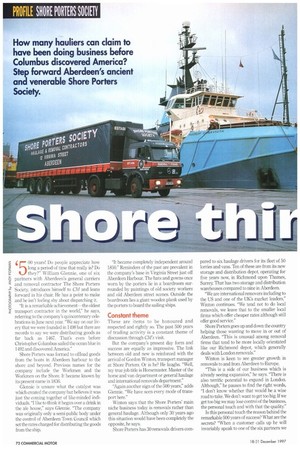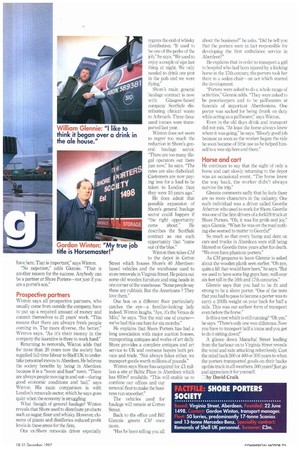PROFILE SHORE PORTERS SOCIETY
Page 74

Page 75

If you've noticed an error in this article please click here to report it so we can fix it.
How many hauliers can claim to have been doing business before Columbus discovered America? Step forward Aberdeen's ancient and venerable Shore Porters Society.
,5 00 years! Do people appreciate how long a period of time that really is? Do they?" William Glennie, one of six partners with Aberdeen's general carriers and removal contractor The Shore Porters Society, introduces himself to CM and leans forward in his chair. He has a point to make and he isn't feeling shy about dispatching it.
"It is a remarkable achievement—the oldest transport contractor in the world," he says, referring to the company's quincentenary celebrations in June next year. "We say on our livery that we were founded in 1498 but there are records to say we were distributing goods as far back as 1467. That's even before Christopher Columbus sailed the ocean blue in 1492 and discovered America."
Shore Porters was formed to offload goods from the boats in Aberdeen harbour to the shore and beyond. Previous names for the company include the Workmen and the Workmen on the Shore. It became known by its present name in 1836.
Glennie is unsure what the catalyst was which created the company but believes it was just the coming together of like-minded individuals. "I like to think it began over a drink in the ale house," says Glennie. "The company was originally only a semi-public body under the control of Aberdeen Town Council which set the rates charged for distributing the goods from the ship. "It became completely independent around 1850." Reminders of the past are prevalent in the company's base in Virginia Street just off Aberdeen Harbour. The hats and gowns once worn by the porters lie in a boardroom surrounded by paintings of old society workers and old Aberdeen street scenes. Outside the boardroom lies a giant wooden plank used by the porters to board the sailing ships.
Constant theme These are items to be honoured and respected and rightly so. The past 500 years of trading activity is a constant theme of discussion through CM's visit.
But the company's present day form and success are equally as impressive. The link between old and new is reinforced with the arrival of Gordon Winton, transport manager at Shore Porters. Or is he? He laughs. "Well, my true job title is Horsemaster. Master of the horse and van department or general haulage and international removals department."
"Again another sign of the 500 years," adds Glennie. "We have seen every mode of transport here."
Winton says that the Shore Porters' main niche business today is removals rather than general haulage. Although only 30 years ago this situation would have been completely the opposite, he says.
Shore Porters has 30 removals drivers com
pared to six haulage drivers for its fleet of 50 lorries and vans. Ten of these are from its new storage and distribution depot, operating for five years now, in Richmond upon Thames, Surrey. That has two storage and distribution warehouses compared to nine in Aberdeen.
"We are international removers including to the US and one of the UK's market leaders," Winton continues. "We tend not to do local removals, we leave that to the smaller local firms which offer cheaper rates although still offer good service."
Shore Porters goes up and down the country helping those wanting to move in or out of Aberdeen. "This is unusual among removal firms that tend to be more locally orientated like our Richmond depot, which generally deals with London removals."
Winton is keen to see greater growth in removals to and from Aberdeen to Europe.
"This is a side of our business which is already seeing expansion," he says. "There is also terrific potential to expand in London. Although," he pauses to find the right words, "I don't know whether that would be a wise road to take. We don't want to get too big. If we get too big we may lose control of the business, the personal touch and with that the quality."
Is this personal touch the reason behind the remarkable 500 years of success? What are the secrets? "When a customer (mils up he will invariably speak to one of the six partners we have here. That is important," says Winton.
"No nepotism," adds Glennie. "That is another reason for the success. Anybody can be a partner at Shore Porters—not just if you are a porter's son."
Prospective partners
Winton says all prospective partners, who usually come from outside the company, have to put up a required amount of money and commit themselves to 21 years' work, "This means that there are always fresh people coming in. The more diverse, the better," Winton says. "As it's their money in the company the incentive is there to work hard."
Returning to removals, Winton adds that for more than 20 years now the society has supplied full-time labour to Shell UK to undertake personnel moves to Aberdeen. He believes the society benefits by being in Aberdeen because it is a "boom and bust" town. "There are always people moving in and out—during good economic conditions and bad," says Winton. His main comparison is with London's removals sector, which he says goes quiet when the economy is struggling.
What though of general haulage? Winton reveals that Shore used to distribute products such as sugar, flour and whisky. However, closures of plants and distilleries reduced profit levels in these areas for the firm.
One ex-Shore removals driver especially regrets the end of whisky distribution. "It used to be one of the perks of the job," he says. "We used to enjoy a couple of sips last thing at night. We only needed to drink one pint in the pub and we were flying."
Shore's main general haulage contract is now with Glasgow-based company ScotSafe distributing clinical waste to Arbroath. Three thousand tonnes were transported last year.
Winton does not seem to regret too much the reduction in Shore's general haulage sector. "There are too many illegal operators out there just now," he says. "The rates are also diabolical. Customers are now paying less for a load to be taken to London than they were 10 years ago."
He does admit that possible expansion of Shore's general haulage sector could happen if "the right opportunity came about." He describes the ScotSafe contract as one such opportunity that "came out of the blue."
Winton then takes CM to the depot in Cotton Street which houses Shore's 40 Aberdeenbased vehicles and the warehouse used to store removals in Virginia Street. He points out some old wooden furniture and stag heads in one corner of the warehouse. "Some people say these are rubbish. But the Americans ? They love them."
One box on a different floor particularly catches the eye—a familiar-looking lady indeed. Winton laughs. "Aye, it's the Venus de Milo," he says. "Nor the real one of course— we've had this one here for six months."
He explains that Shore Porters has had a long association with major auction houses, transporting antiques and works of art daily. Shore provides a complete antiques and art service to UK and overseas buyers both private and trade. "Not always fakes either, we transport goods worth millions of pounds."
The vehicles used for haulage will remain at Cotton Street.
Back to the office and Bill Glennie greets CM once more.
"Has he been telling you all about the business?" he asks. "Did he tell you that the porters were in fact responsible for developing the first ambulance service in Aberdeen?"
He explains that in order to transport a girl to hospital who had been injured by a kicking horse in the 17th century, the porters took her there in a sedan chair—an act which started the development.
"Porters were asked to do a whole range of activities," Glennie adds. "They were asked to be peacekeepers and to be pallbearers at funerals of important Aberdonians. One porter was sacked for being drunk on duty while acting as a pallbearer," says Winton, Even in the old days drink and transport did not mix. "At least the horse always knew where it was going," he says. "Bloody good job because as soon as the worker began the ride he soon became of little use as he helped himself to a wee sip here and there."
Horse and cart
He continues to say that the sight of only a horse and cart slowly returning to the depot was an occasional event. 'The horse knew the way back, the worker didn't always survive the trip."
Glennie comments sadly that he feels there are no more characters in the industry. One such individual was a driver called Geordie Atherton who used to work for Shore. Geordie was one of the first drivers of a forklift truck at Shore Porters. "Oh, it was his pride and joy," says Glennie. "When he was on the mad nothing else seemed to matter to Geordie!"
So much so that every bump and dent on cars and trucks in Aberdeen were still being blamed on Geordie three years after his death. "We even have phantom porters."
As CM prepares to leave Glennie is asked about the wooden plank seen earlier. "Oh aye, quite a lift that would have been," he says. "But we used to have some big guys here, well over six feet tall in the 16th and 17th centuries."
Glennie says that you had to be fit and strong to be a shore porter. "One of the tests that you had to pass to become a porter was to carry a 2001b weight on your back for half a mile. This was our earliest form of transport even before the horse."
Is-this a test which is still running? "Oh yes," he says. "There's only one wee difference. Now you have to transport half a tonne and you get to do it sitting down!"
A glance down Marschal Street leading from the harbour on to Virginia Street reveals the wind and rain attacking relentlessly. Cast the mind back 500 or 400 or '300 years to when the porters transported goods on their backs up this track in all weathers. 500 years? Just go and appreciate it for yourself.
11 by David Craik
SHORE PORTERS SOCIETY
Virginia Street, Aberdee n. 22 June
1498, Cc Gordon Winton, transport manager.
50 lorries, predominantly 17-tonne Scanias and 13-tonne Mercedes-Benz.
Removals of Shell UK personnel. e3m.












































































































































